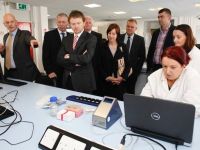NIGTA members attending the launch of the Food Fortress pilot scheme for compounders were not only reassured regarding the impact and effectiveness of the scheme, but were totally impressed by the support that it would have from the Global Food Security Unit at Queens University - a unique and world leading facility.
Chris Elliott, Professor of food safety at QUB told his audience that this £33 million investment which had funding from global organisations such as the Gates Foundation can take feed and food testing to a whole new level and give the agri food industry in Northern Ireland a major competitive advantage.

This cutting edge technology is attracting interest from the major retailers such as Tesco and Marks and Spencer who wish to monitor and test for contaminants in order to avoid food scares such as the recent horse meat scare.
These comments were supported by Professor Pat Wall from University College , Dublin, who has been involved with the Food Fortress scheme since its inception. He pointed out that the food chain is now a very complex one with ingredients for animal and human food sourced from around the world. The animal feed industry is at the very beginning of this chain - it is like the foundation of a house – something wrong at this stage can undermine the entire building.
Owen Brennan, NIGTA President, pointed out that the increase in global population along with the increase in incomes will have a big effect on food production. Northern Irelands ambitious plan for growth in the Agri food industry can only be delivered with the highest standards of quality and safety and the Food Fortress will be a key element of that strategy for growth. Queens work in analysing the history of incidents in the Food Chain and their risk assessments are the basis of the new scheme. They highlighted the potential for a coordinated program to bring together all the testing currently carried out to deliver a much more robust scheme to protect the industry.
When thanking the speakers for their input and the NIGTA members for their attendance Owen Brennan emphasised that the launch of Food Fortress would be greatly enhanced if those present communicated the information they had received to others in their company and even more importantly, to their customers.
The operation of the Food Fortress pilot was detailed by Robin Irvine, Chief Executive of NIGTA. The pooling of information was a key element with samples called off on a rota basis to ensure a spread across all raw materials, across the main contaminants and throughout the year. This bank of information would be the key to dealing with future problems in that an incident can be viewed against the background of the whole testing program. This will help inform regulators and should ensure a proportionate response to issues as they arise. The use of composite samples will ensure that costs are kept to a minimum and mean that scheme members will have a much greater level of assurance for the money they spend.
NIGTA Queens University Visit September 2013











